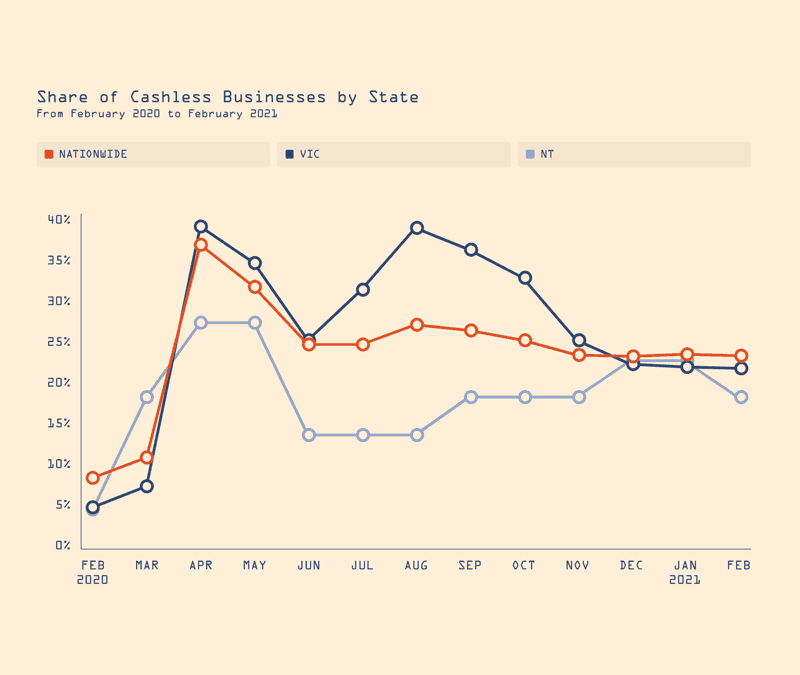Due to ongoing developments in payment technologies, processing transactions at point-of-sale are quicker and easier than ever. It’s no surprise that these advancements have caused a change in the way that Aussies use cash.
According to Square’s Payment and Pandemic Report 2021, 1 in 4 businesses were operating as cashless compared to 1 in 12 businesses in February 2020, and the trend continues to grow. It’s clear that it isn’t a choice for most businesses but a preference with customers too.

In this article, we’ll explain how you can legally refuse cash payments, the advantages and disadvantages of cashless payments and the steps you must take to refuse cash payments.
Read along!
Table of Contents
Reasons for refusing cash
Decrease in popularity of using cash
Apart from Square’s report, the 2022 Global Payments Report estimates that by 2025, cash will only represent two per cent of all point-of-sale transactions in Australia. The Australian Banking Association reported that ATM withdrawals declined by 20% between August 2020 and August 2021.

Clearly, the use of cash is declining, so it might not make sense for retailers like you to spend time and money on keeping that payment option open for your customers.
Hygiene
In recent times, Australian businesses have introduced policies that only accept contactless payment. This is to maintain hygiene, minimise contact and prevent the spread of germs in the wake of the coronavirus pandemic (COVID-19).
The Square report highlights the reluctance of customers and businesses to physically deal with money during a time when minimising the spread of COVID is crucial. It also highlighted that the decline in using cash payments is occurring internationally, including in countries such as UK, Japan, Canada and the U.S.
Cost-minimisation
However, it may be advantageous for a business to streamline the way it accepts payments, for example, by going cashless in order to minimise costs.
Research conducted by Square highlighted the effect cash has on businesses. Small businesses spend an average of almost 29 working days a year handling, counting and banking cash. That amounts to $8.7 billion in staff wages per annum across all Australian small and medium-sized businesses.
If you’re looking for more ways to reduce your business costs have a look at how you can boost your business cash flow and claim tax for some tax-deducticble expenses.
Other benefits of cashless payments
If your customers are not buying the ‘no cash’ policy, you can educate them on the the benefits of using electronic payments such as:
- It’s quicker and more convenient to make cashless payments
- Customers can avoid fees associated with using cash, such as ATM withdrawal fees
- Customers can avoid eftpos fees
Want more?
Sign up for our newsletter and be the first to find hand-picked articles on topics that we believe are crucial to successfully scale your unique small business.
By clicking on 'Sign up to our newsletter' you are agreeing to the Lawpath Terms & Conditions
Reasons for accepting cash
There are many benefits provided to consumers through continuing to make cash payments, these include the following:
- By using cash to make payments, you can avoid security issues that are associated with making electronic payments
- Consumers are less likely to overspend or make impulse purchases if they’re using cash
- Consumers can remain anonymous by using cash payments
- Consumers can avoid technological issues that may prevent them from accessing their money
- By using cash, consumers can avoid any fees charged by payment providers
- By making cash payments, customers can avoid hidden fees that are associated with electronic payments
- Some consumers would prefer to continue to make cash payments as they may not be tech-savvy, and therefore they would like to avoid struggling to make electronic payments and the learning curve associated with them
- Customers can avoid eftpos fees
What is legal tender in Australia?
Section 36 of the Reserve Bank Act 1959 (Cth) provides that Australian banknotes are legal tender throughout the country.
Whereas it’s section 16 of the Currency Act 1965 (Cth) that gives legal tender status to Australian coins. However, coins will only be legal tender:
- If the payment is being made using five-cent coins, ten-cent coins , twenty-cent coins , fifty-cent coins, or any combination of those coins, the maximum payment that can be made is only $5
- If the payment is being made using one-cent or two-cent coins or any combination of those coins, the maximum payment that can be made is only 20 cents
- If the payment is being made using coins with a value over fifty cents, but less than ten dollars, the maximum payment that can be made can’t be more than 10 times the face value of the coin being used for payment
- If the payment is being made using coins with a denomination of ten dollars, the maximum payment that can be made is $100
- If the payment is being made using coins with any other denomination, there is no limit on the payment amount
Is it legal to refuse cash in Australia?
The short answer is no. While Australian currency is legal tender (meaning other currencies can’t be used), it doesn’t mean that cash must be the only payment method. By purchasing goods or services, you’re entering into a contract with the seller. A business can set the terms of the contract prior to the purchase, including how payment will be made.
Therefore if you provide verbal or written notice prior to entering the contract with your customer, your business isn’t obliged to accept cash as a form of payment. And instead, you can state you’re only accepting cashless payments.
For example, a business could state that they’re only accepting card-only payments. Therefore their customers could be required to use a debit card or a credit card. In practice, this is how vending machines can exclude the use of low denomination coins by displaying a sign notifying purchasers.
Similarly, some small businesses refuse cash payments when they don’t want to deal with the expenses of carrying and accepting cash. It’s not uncommon for some shops to display place signs at their checkout or at the door to give customers adequate that they refuse cash payments.
Conclusion
If you’re a business owner who’s looking to reduce costs, take comfort in knowing that you can refuse to accept cash. Given that you’re setting the terms of the contract with your customers, you can choose whichever payment method you prefer.
However, you must keep in mind that you may be required to provide adequate notice to potential clients that you have decided not to accept cash payments.
If you’re still feeling uncertain, you should hire a lawyer for legal advice.




